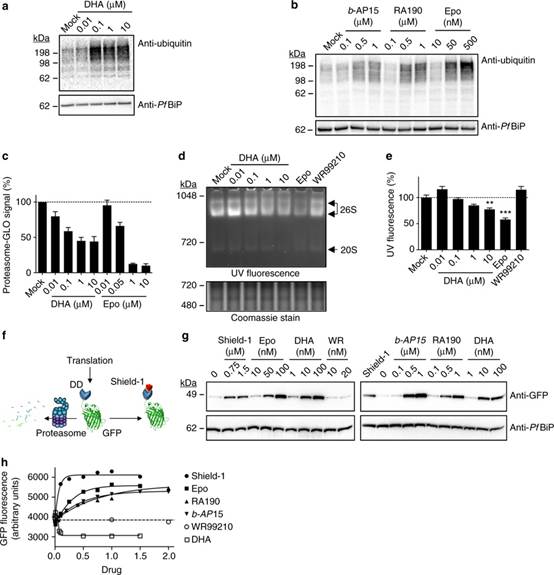抗癌药联合青蒿素双管齐下攻克耐药疟原虫
来源:《自然通讯》
作者:Jessica L. Bridgford等
时间:2018-10-16


根据一项最新发表在《Nature Communications》上的研究,科学家们已经找到了一种使用化疗药物显著增强世界上最有效的抗疟疾药物疗效的方法。来自墨尔本大学和日本药企Takeda的科学家们发现抗疟疾药物青蒿素是通过一种双重作用攻击致命疟原虫来发挥疗效的。这个药物会损伤疟原虫表面的蛋白质,堵塞疟原虫的废物处理系统——蛋白酶体。
墨尔本大学疟疾研究专家Leann Tilley说道:“双重杀伤效应意味着将青蒿素和另一种靶向蛋白酶体的抗癌化疗药物联合使用以增强青蒿素的活性,可以有效恢复青蒿素对抗青蒿素耐受性病原体的能力。”
全球每年约有45万人死于疟疾,东南亚地区的病原体已经产生了青蒿素耐药性,这种病原体也可能在不久的将来传播大非洲。
“这种寄生虫的蛋白酶体就像一台碎纸机,可以将受损或无用的蛋白质撕碎。”Tilley说道。“使用青蒿素治疗疟疾寄生虫会使之产生很多损坏的蛋白质。青蒿素和蛋白酶体抑制剂可以联合起来阻止这条通路。”抑制蛋白酶体可以使损坏的蛋白质堆积,这是死亡之吻的标志之一。但这些损坏蛋白质堆积之后,它们可以给寄生虫施加压力,最终导致它们死亡。
Tilley教授和她的团队与Takeda及瑞士非营利研究基金会疟疾药物项目合作,试图找到能够特异性抑制疟原虫蛋白酶体的抑制剂,以尽快推上临床实验。“我们现在正在进行药物化学研究,试图开发出与人类蛋白酶体抑制剂相似的抑制剂以特异性抑制病原体的蛋白酶体。”Tilley教授说道。“我们想要一种可以口服且可以在血液中长期存在的药物,如果能够找到合适的药物,我们就会尽快启动人体临床试验。”(来源:生物谷Bioon.com)
Artemisinin kills malaria parasites by damaging proteins and inhibiting the proteasome
Abstract Artemisinin and its derivatives (collectively referred to as ARTs) rapidly reduce the parasite burden in Plasmodium falciparuminfections, and antimalarial control is highly dependent on ART combination therapies (ACTs). Decreased sensitivity to ARTs is emerging, making it critically important to understand the mechanism of action of ARTs. Here we demonstrate that dihydroartemisinin (DHA), the clinically relevant ART, kills parasites via a two-pronged mechanism, causing protein damage, and compromising parasite proteasome function. The consequent accumulation of proteasome substrates, i.e., unfolded/damaged and polyubiquitinated proteins, activates the ER stress response and underpins DHA-mediated killing. Specific inhibitors of the proteasome cause a similar build-up of polyubiquitinated proteins, leading to parasite killing. Blocking protein synthesis with a translation inhibitor or inhibiting the ubiquitin-activating enzyme, E1, reduces the level of damaged, polyubiquitinated proteins, alleviates the stress response, and dramatically antagonizes DHA activity.
原文链接:https://www.nature.com/articles/s41467-018-06221-1.pdf




